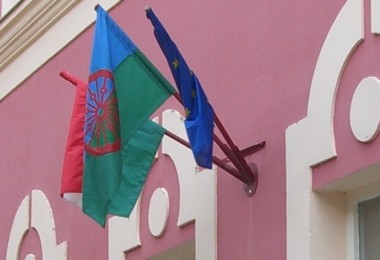Translation Romani has decided to maintain use of the word Romani in all language versions of this website, inclusively and in reference both to the language and people of all the diverse ethnic communities throughout the world, i.e. Roma, Sinti, Manuš, Calé, Romanichal, Kalé, and many others. Please read the important notes from our translators for explanations and other translations currently in use locally, nationally or regionally.
Close this box.
"Nation" generally refers to a community of people inhabiting a territory that is organized politically by a common government, i.e. the "nation-state". Likewise, it also denotes a people sharing a common history, and certain traditions of language and culture. "Nation" is not always synonymous with "nation-state", for example, as reflected in the motions proposed in 2006 to recognize Catalonia as a nation within Spain and Québec as a nation within Canada. In the absence of a physical, geographical territory or homeland, "nation" must depend conceptually on other definitions, in order for the linguistic and cultural rights of a specific group of people to be addressed and recognized. Complex situations can sometimes arise if nation-state citizenship implies minimizing or eradicating the ethnic and minority differences associated with "nations". The imperative for political recognition takes on even greater importance when language planning for language survival or policies supportive of sustainable language development is a priority, especially given that modern colonization and globalization have contributed to currently endangering almost half of the world`s approximately 7,000 languages.
Although prior efforts certainly exist, the year 1971 can be considered as a foundational date for the history of modern Romani nation aspirations. At the 1st World Romani Congress in London, a flag, motto and anthem were chosen, and April 8th was proclaimed International Romani Day worldwide. These symbols, reflective of a modern nation`s identity, merge with centuries-old orally transmitted cultural traditions like Romaniya (Romani law) or Romanipe, and the Kris (judiciary council), which have contributed to maintaining internal social coherence and cohesion within Romani families and communities for almost 1000 years. Since the early 1970s, Romani organization and mobilization have varied in concept, strategy and action. Several successive World Romani Congresses have taken place. In 1978, the International Romani Union (with current headquarters in Prague) was created at the 2nd World Romani Congress in Geneva. The Roma National Congress emerged in the mid-1980s, based in Hamburg, Germany. The creation and subsequent enlargements of the European Union have prompted NGOs and others (CoE Roma and Travellers, ERTF, ERIO, ERRC, etc.) to organize and implement initiatives focused on examining Romani minority rights within Europe.
In the face of globalization and increasing inter-connectedness among communities worldwide, activist positions envision not only a Romani "nation" rooted in a common history and tied in with multiple local and national histories across the planet, but also a people`s individual and collective rights in terms of basic human rights. These rights, as laid out in the United Nations Universal Declaration of Human Rights, and which have been translated into Romani as well, can serve as a foundation to create and enforce the legislation needed to combat prejudice, discrimination, racism and persecution, and to provide for livable housing, clean water, health services, and access to education and employment.
References:
Garo, Morgan (2009), Les Rroms. Une nation en devenir ?, Paris: Éditions Syllepse.
Karanth, Dileep (ed), Danger! Educated Gypsy. Selected Essays. Ian Hancock, Hertfordshire: University of Hertfordshire Press, 2010.
Kenrick, Donald (2004), The Romani World. a historical dictionary of the Gypsies, Hertfordshire: University of Hertfordshire Press.
O`Nions, Helen (2007), Minority Rights Protection in International Law. The Roma in Europe, Hampshire: Ashgate Publishing Ltd.
Patrin, "A Brief History of the Roma", retrieved on 4 Sept 2011 at http://www.reocities.com/~patrin/history.htm.
Sigona, Nando and Trehan, Nidhi (eds), Romani Politics in Contemporary Europe. Poverty, Ethnic Mobilization, and the Neoliberal Order (New York: Palgrave Macmillan, 2009).
Vermeersch, Peter (2006), The Romani Movement. Minority Politics & Ethnic Mobilization in Contemporary Central Europe, New York, Oxford: Berghahn Books.
Weyrauch, Walter O. (ed), Gypsy Law. Romani Legal Traditions and Culture (Berkeley: University of California Press, 2001).

So mai keres? (Kalderash)
So ćere(s)h? (Gurbeti)
O Del andas tut! (Lovari)
Sar sijan|Sar san? (Xoraxane)


